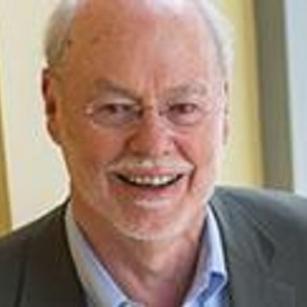
77 Massachusetts Ave.
Cambridge, MA 02139
Degrees
- PhD in Chemistry, University of Illinois at Champaign-Urbana, 1969
- BA in Chemistry and Mathematics, Union College, 1966
Bio
A world leader of research in molecular biology and biochemistry, Dr. Phillip A. Sharp is Institute Professor at the Massachusetts Institute of Technology, the highest academic rank at the Institute.
Much of Dr. Sharp’s scientific work has been conducted at MIT’s Center for Cancer Research (now the Koch Institute), which he joined in 1974 and directed from 1985 to 1991. He subsequently led the Department of Biology from 1991 to 1999 before assuming the directorship of the McGovern Institute from 2000 to 2004. His research interests have centered on the molecular biology of gene expression relevant to cancer and the mechanisms of RNA splicing. His landmark achievement was the discovery of RNA splicing in 1977. This work provided one of the first indications of the startling phenomenon of “discontinuous genes” in mammalian cells. The discovery that genes contain nonsense segments that are edited out by cells in the course of utilizing genetic information is important in understanding the genetic causes of cancer and other diseases. This discovery, which fundamentally changed scientists’ understanding of the structure of genes, earned Dr. Sharp the 1993 Nobel Prize in Physiology or Medicine. His lab has now turned its attention to understanding how RNA molecules act as switches to turn genes on and off (RNA interference). These newly discovered processes have revolutionized cell biology and could potentially generate a new class of therapeutics.
Dr. Sharp has authored over 400 scientific papers. He has received numerous awards and honorary degrees, and has served on many advisory boards for the government, academic institutions, scientific societies, and companies, including the presidency of the AAAS (2013); Chair of the Scientific Advisory Committee; and SU2C Project, AACR.
A native of Kentucky, Dr. Sharp earned a BA degree from Union College, KY in 1966, and a PhD in chemistry from the University of Illinois, Champaign-Urbana in 1969. He completed his postdoctoral training at the California Institute of Technology, where he studied the molecular biology of plasmids from bacteria in Professor Norman Davidson’s laboratory. Prior to joining MIT, he was Senior Scientist at Cold Spring Harbor Laboratory. In 1978 Dr. Sharp co-founded Biogen and in 2002 he co-founded Alnylam Pharmaceuticals.
Research
High throughput sequencing of RNA populations revealed the generation of small RNAs from divergent transcription in mammalian cells. The role of this pervasive transcription is under investigation. We are investigating the roles of divergent transcription in the activity of super-enhancers of transcription. These super-enhancers form condensates with many properties expected of liquid-liquid phase transitions. Such condensates concentrate the multitude factors and RNA polymerases for initiation of a burst of transcription. The same high throughput technology allows definition of alternatively spliced isoforms. Shifts in isoforms are common in cancer versus normal cells. We are investigating these processes and, in particular, the relationship between elongation of transcription, RNA splicing and chromatin modifications.
Research Areas of Focus
Nano-based Drugs
Metastasis
Personalized Medicine
Selected Awards/Societies
- Double Helix Medal, CSHL, 2006
- National Medal of Science, 2004
- Benjamin Franklin Medal for Distinguished Achievement in the Sciences, 1999
- Nobel Prize in Physiology or Medicine, 1993
- Dickson Prize, 1991
- Albert Lasker Basic Medical Research Award, 1988
- Louisa Gross Horowitz Prize, 1988
- Gairdner Foundation International Award, 1986
- General Motors Research Foundation Alfred P. Sloan, Jr. Prize for Cancer Research, 1986
- NAS Award in Molecular Biology, 1980
- Member, National Academy of Sciences
- Member, Institute of Medicine
- Member, American Academy of Arts and Sciences
- Member, American Philosophical Society
- Foreign Member, Royal Society, UK
Selected Publications
- D. Hnisz, K. Shrinivas, R. A. Young, A. K. Chakraborty, and P. A. Sharp. “A phase separation model for transcriptional control.” Cell 169 (2017): 13–23.
- P. L. Boutz, A. Bhutkar, and P. A. Sharp. “Detained introns are a novel, widespread class of post-transcriptionally spliced introns.” Genes Dev. 29.1 (2015): 63-80.
- S. Chen, N. E. Sanjana, K. Zheng, O. Shalem, K. Lee, X. Shi, D. A. Scott, J. Song, J. Q. Pan, R. Weissleder, H. Lee, F. Zhang, and P. A. Sharp. “Genome-wide CRISPR Screen in a Mouse Model of Tumor Growth and Metastasis.” Cell 160.6 (2015): 1246-60.
- A. D. Bosson, J. R. Zamudio, and P. A. Sharp. “Endogenous miRNA and target concentrations determine susceptibility to potential ceRNA competition.” Mol. Cell 56.3 (2014): 347-59.
- S. Chen, Y. Xue, X. Wu, C. Le, A. Bhutkar, E. L. Bell, F. Zhang, R. Langer, and P. A. Sharp. “Global microRNA depletion suppresses tumor angiogenesis.” Genes Dev. 28.10 (2014): 1054-67.
- M. Jangi, P. L. Boutz, P. Paul, and P. A. Sharp. “Rbfox2 controls autoregulation in RNA-binding protein networks.” Genes Dev. 28.6 (2014): 637-51.
A full list of Dr. Sharp’s publications can be found on PubMed.
Description
High throughput sequencing of RNA populations revealed the generation of small RNAs from divergent transcription in mammalian cells. The role of this pervasive transcription is under investigation. We are investigating the roles of divergent transcription in the activity of super-enhancers of transcription. These super-enhancers form condensates with many properties expected of liquid-liquid phase transitions. Such condensates concentrate the multitude factors and RNA polymerases for initiation of a burst of transcription.
